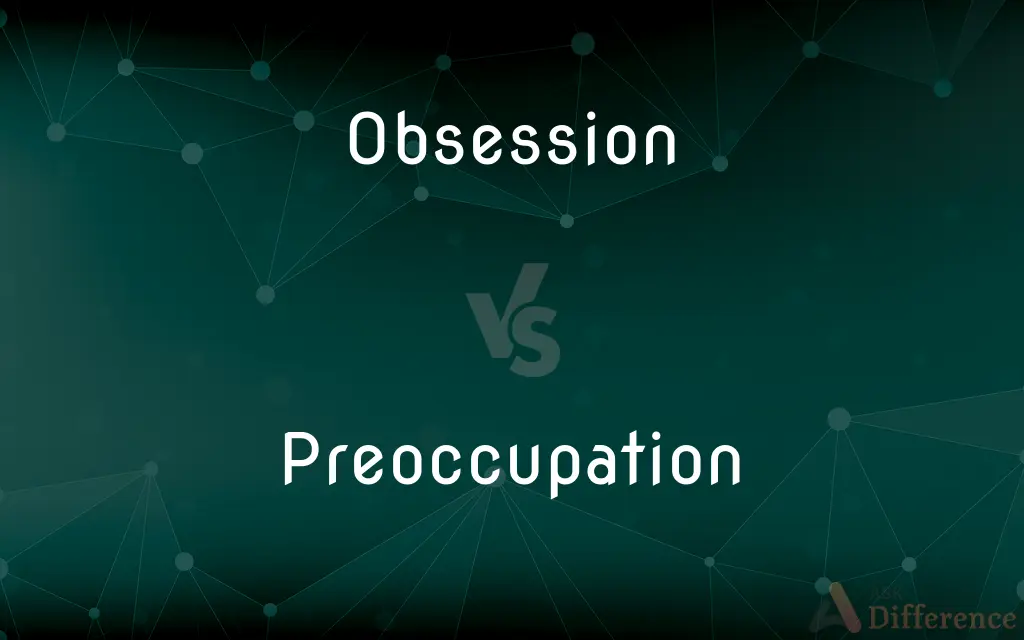Obsession vs. Preoccupation — What's the Difference?
By Tayyaba Rehman & Urooj Arif — Updated on April 16, 2024
Obsession involves a persistent and often intrusive fixation on an idea or person, leading to significant distress; preoccupation is a state of being engrossed in thoughts or activities, which doesn't necessarily disrupt daily life.

Difference Between Obsession and Preoccupation
Table of Contents
ADVERTISEMENT
Key Differences
Obsession is characterized by uncontrollable thoughts that consume significant mental energy and often result in anxiety or distress. On the other hand, preoccupation refers to a high level of engagement with a particular subject or task, which might distract temporarily but is typically manageable.
Individuals with an obsession may find it difficult to perform everyday tasks due to their fixation, whereas those who are preoccupied can usually still manage their daily responsibilities, albeit with occasional lapses in attention.
The nature of obsession is often linked to deeper psychological issues or disorders, such as OCD (Obsessive-Compulsive Disorder), while preoccupation is generally a temporary and less severe condition, often triggered by specific events or pressures.
Treatment for obsession may require professional psychological intervention, such as therapy or medication, highlighting its severity. In contrast, preoccupation often resolves with changes in circumstances or through conscious redirection of attention.
The impact of obsession on personal relationships can be profound, potentially leading to isolation or strained interactions. Preoccupation, while it may cause some frustration for others, usually does not have long-lasting effects on social or familial bonds.
ADVERTISEMENT
Comparison Chart
Definition
Persistent, intrusive, and distressing fixation.
Temporary and intense focus on an idea or task.
Psychological Impact
Causes significant anxiety or distress.
Generally does not cause significant distress.
Effect on Daily Life
Disruptive, often impairs daily functioning.
Distracting but usually allows for normal functioning.
Associated Conditions
Often linked with psychological disorders like OCD.
Usually not linked with psychological disorders.
Treatment
May require therapy or medication.
Often resolved through self-management or time.
Compare with Definitions
Obsession
An overwhelming and compulsive interest or feeling.
His obsession with cleanliness makes it hard to relax at home.
Preoccupation
A temporary yet intense focus that can distract from other tasks.
His preoccupation with his new job left little time for social outings.
Obsession
A recurrent, persistent thought or desire.
His obsession with winning often kept him up at night.
Preoccupation
A condition of being mentally engrossed or occupied.
Her preoccupation with her thesis made her oblivious to the chaos around her.
Obsession
An idea or thought that continually preoccupies or intrudes on a person's mind.
She couldn’t shake her obsession with what her colleagues thought of her.
Preoccupation
A state of being absorbed in thoughts or an activity.
His preoccupation with video games is affecting his grades.
Obsession
An excessive preoccupation with a perceived need or goal.
His obsession with detail is evident in every project he undertakes.
Preoccupation
Focus on a particular matter with considerable interest.
His preoccupation with solving complex puzzles is well-known among his friends.
Obsession
A fixation that dominates one's thoughts.
Her obsession with becoming an actress consumes all her conversations.
Preoccupation
Engrossment in a specific topic or issue.
During the election, her preoccupation was with political news.
Obsession
A compulsive, often unreasonable idea or emotion.
Preoccupation
The state of being preoccupied; absorption of the attention or intellect.
Obsession
(Psychiatry) A pattern of unwanted or intrusive thoughts or urges that recur persistently, often accompanied by symptoms of anxiety.
Preoccupation
Something that preoccupies or engrosses the mind
Money was their chief preoccupation.
Obsession
The quality of being obsessed.
Preoccupation
The state of being preoccupied or an idea that preoccupies the mind; enthrallment.
Obsession
An idea that engenders a compulsive or irrational preoccupation, or the preoccupation thereby engendered.
Preoccupation
The act of occupying something before someone else.
Obsession
An activity or entity that inspires a compulsive and potentially unhealthy fixation, or the fixation thereby inspired.
Editing Wikipedia started as a hobby, but it's turned into a complete obsession of mine.
Preoccupation
The act of preoccupying, or taking possession of beforehand; the state of being preoccupied; prepossession.
Obsession
Influence or control by evil spirits without possession.
Preoccupation
Anticipation of objections.
Obsession
The act of besieging.
Preoccupation
An idea that preoccupies the mind and holds the attention
Obsession
The state of being besieged; - used specifically of a person beset by a spirit from without.
Whether by obsession or possession, I will not determine.
Preoccupation
The mental state of being preoccupied by something
Obsession
An excessive preoccupation of the thoughts or feelings; the persistent haunting or domination of the mind by a particular desire, idea, or image.
Preoccupation
The act of taking occupancy before someone else does
Obsession
Any driving motive; a compelling goal; - not necessarily implying a negative judgment, as does sense 3; as, the coach was obsessed with winning the state championship
Obsession
Something that causes an obsession{3}.
Obsession
The state of being obsessed.
Obsession
An irrational motive for performing trivial or repetitive actions against your will
Obsession
An unhealthy and compulsive preoccupation with something or someone
Common Curiosities
What are some common triggers for obsession?
Common triggers include stress, anxiety, or underlying mental health conditions such as OCD.
How can one manage an obsession?
Managing an obsession typically requires psychological intervention such as cognitive-behavioral therapy or medication.
What is the main difference between obsession and preoccupation?
Obsession is a persistent and intrusive fixation that often causes distress, whereas preoccupation is a temporary and intense focus that usually does not disrupt daily life.
Can a preoccupation turn into an obsession?
Yes, if a preoccupation becomes persistent and starts causing distress, it can evolve into an obsession.
How does obsession affect relationships?
Obsession can strain or damage relationships due to the individual’s intense focus and potential neglect of interpersonal obligations.
Are there positive aspects to having an obsession?
While generally problematic, some obsessions can lead to high achievement in specific areas, provided they are managed healthily.
How does society view obsession and preoccupation?
Society often views obsession negatively due to its disruptive effects, while preoccupation is seen as less severe.
Can children be preoccupied?
Yes, children can become preoccupied with interests or activities, which is usually part of normal development.
What role do cultural factors play in obsession?
Cultural factors can influence the content of obsessions and the stigma associated with them.
Is preoccupation always a negative state?
No, preoccupation can be beneficial, such as when it involves engagement in productive activities or solving problems.
Is it easy to recognize one's own obsession?
Recognizing an obsession can be challenging for the individual involved, often requiring external intervention or feedback.
What are the first steps to take if someone thinks they are developing an obsession?
Seeking advice from a mental health professional is a crucial first step in addressing potential obsessions.
How does one typically realize they are preoccupied?
Realization often occurs when noticing a temporary neglect of other responsibilities or interests.
What is an example of a healthy preoccupation?
A healthy preoccupation might involve deep engagement in learning a new skill or hobby that enhances personal growth.
Can obsession be cured?
Obsession can often be managed effectively with treatment, though it may not be "cured" in the traditional sense.
Share Your Discovery

Previous Comparison
Drifter vs. Vagabond
Next Comparison
Cow vs. OxAuthor Spotlight
Written by
Tayyaba RehmanTayyaba Rehman is a distinguished writer, currently serving as a primary contributor to askdifference.com. As a researcher in semantics and etymology, Tayyaba's passion for the complexity of languages and their distinctions has found a perfect home on the platform. Tayyaba delves into the intricacies of language, distinguishing between commonly confused words and phrases, thereby providing clarity for readers worldwide.
Co-written by
Urooj ArifUrooj is a skilled content writer at Ask Difference, known for her exceptional ability to simplify complex topics into engaging and informative content. With a passion for research and a flair for clear, concise writing, she consistently delivers articles that resonate with our diverse audience.















































